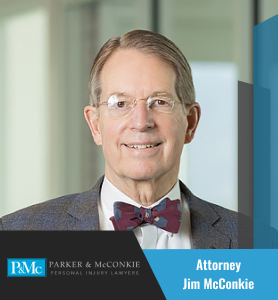
Semi-truck accidents are more common than most people anticipate. The accident scene involving these enormous vehicles often ends devastatingly. Victims involved in such accidents often incur exorbitant medical bills.
More often than not, victims could not hold the defendant accountable for their injuries.
Hiring an aggressive and dedicated Utah truck accident attorney is crucial to achieving justice. At Parker & McConkie, our team of Utah truck accident lawyers is always ready to help.
Throughout our years of experience, we delivered justice to countless truck accident victims. Our esteemed personal injury law firm can help recover the compensation you deserve.
If you have been injured in a truck accident in Utah, contact our Utah personal injury law firm at (801) 845-0440 to schedule a free consultation with one of our truck accident attorneys.
Table of Contents
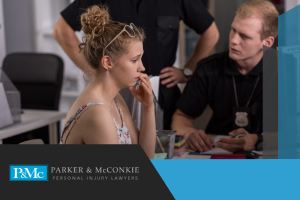
A Utah truck accident lawyer can help level the playing field. They can place you in a far better position to recover the most monetary compensation. A Utah trucking accident lawyer at Parker & McConkie can aid you in various ways.
• Case assessment. Our Utah truck accident attorneys can help by conducting a meticulous case investigation. We will assess every side of your case and uncover the factual accounts of the accident.
• Recover evidence. The key to building a compelling truck accident case is by presenting solid pieces of evidence. We can help you recover video footages, witness accounts, or reports that corroborate your versions of the accident.
• Process claims. In most truck accident cases, the insurance company of the at-fault truck driver will try to minimize your compensation. With our help, you can prevent this from happening.
• Case representation. Some truck drivers or their companies may not take responsibility for their negligence. In this case, we can represent you on your behalf. We can help you guarantee that you will attain the justice you deserve.
Victims will be at a tremendous disadvantage if they opt to go alone after a truck accident. Any parties involved will have their own insurance companies and attorneys. The truck company, the firm that loaded the cargo, or the truck part manufacturer will do their best to dodge liability. Because the stakes are so high, the case will undoubtedly be highly disputed.
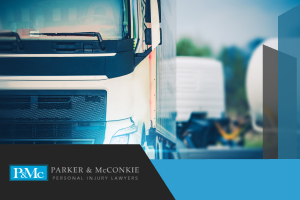
There are thousands of legislations covering trucking laws in Utah. However, for almost every semi-truck accident attorney in Utah, these ten sections of the law are deemed necessary. Truck drivers and pedestrians will benefit from understanding the basics of these laws.
Utah adopted sections 350 to 399 under Title 49 of the Federal Motor Carrier Safety Regulations. Here are the branches of the law assumed by the state:
1. 49 CFR 382. Section 382 under Title 49 of the Federal Regulation discusses the consumption of alcohol and controlled substances by commercial drivers. This section of the law aims to protect truck drivers and other commercial drivers from the dangers of intoxicated driving.
2. 49 CFR 383. This section of the law provides the standard requirements. It also mandates the licensing of commercial driver’s licenses. The law aims to reduce trucking accidents by following the established standards.
3. 49 CFR 385. This section of the Vehicle Code regulates the safety fitness of motor carriers. This law appoints a safety rating to motor carriers to ensure that they are not substandard.
4. 49 CFR 387. This subpart requires motor carriers to maintain a minimum financial responsibility for their vehicles. This also ensures that victims can hold motor operators accountable for accidents.
5. 49 CFR 390.5. This section of the law discusses the general definition of Federal Motor Carrier Safety Regulations. Furthermore, this section of the law also provides the necessary description of terms used in the Vehicle Code.
6. 49 CFR 391. This part of the law requires commercial drivers to meet standard legal requirements before operating a truck or other commercial vehicles.
7. 49 CFR 392. This section discusses the minimum requirements for qualifications to drive commercial motor vehicles. The purpose is to reduce trucking accidents caused by inexperienced drivers.
8. 49 CFR 393. This section of the Vehicle Code discusses the commercial vehicle’s equipment requirement. This section aims to reduce trucking accidents caused by faulty or substandard truck parts.
9. 49 CFR 395. This law section covers drivers’ working hours to ensure they are not overworked. The purpose is to reduce trucking accidents caused by fatigued drivers.
10. 49 CFR 396. This section of the Vehicle Code mandates vehicle operators to inspect and maintain their vehicle’s condition routinely. The purpose is to ensure that commercial vehicles operate under optimal conditions.
A roadside accident is more prevalent than one might think. Statistics suggest that one person is victimized by a car accident every 22 minutes in Utah. This statistic does not only include private vehicle accidents but also semi-truck accident cases.
A commercial truck accident inflicts the most serious injuries. In 2018, the United States reported 4,951 individual fatalities related to commercial truck accidents. 71% of personal injury victims were occupants of the other commercial vehicle. This figure corresponds to the fact that the overall reported number of injured individuals reaches 151,000 or 72%.
Only 9% of large trucks are involved in fatal crashes in Utah. This number is considered average in 2018 statistics. Wyoming held the most reported truck-related accidents in 2018, with 19.7% instances.
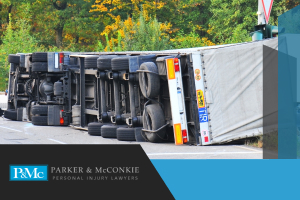
Several contributing factors affect the likeliness of a truck accident from happening. We listed the following reasons below:
• Truck part failure. There are instances when a truck part fails to function correctly. A faulty truck part, such as a flat tire, can cause unwanted truck incidents. Because of this, it’s critical to maintain the truck’s condition before operating.
• Driver error. Accidents caused by driver error are also commonly known as “driver-related” accidents. Most truck drivers make mistakes on the road, which cause collisions. This error can be due to overspeeding, reckless driving, cellphone distractions, and other reasons for unsafe driving.
• Drunk driving. Intoxicated driving is another common cause of truck accidents. Most vehicle accidents occur because of intoxicated drivers.
• Failure to yield right of way. Utah law states that all drivers must observe traffic signs and lights. Sometimes, crashes happen because drivers fail to follow the rules for providing the right of way to pedestrians or other drivers.
• Driver fatigue. It is not advisable for truck drivers to drive during midnight. This restriction is because their bodies adjust to the natural sleep cycle. Driving while exhausted can affect truckers’ attention span, causing them to lose concentration on the road.
As established above, truck-related accidents often result in life-threatening injuries. It’s crucial to understand the dangers of semi-truck or commercial vehicle accidents. Understanding this will help drivers be more careful when driving.
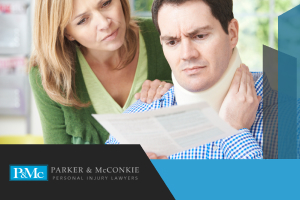
Victims who suffer from severe injuries due to a semi or commercial truck accident have the right to claim significant compensation for their damages. It is outlined in the law that the party liable for the accident must provide compensation to the injured party. As a victim, the burden of identifying liability falls upon your shoulder.
Here are the damages or compensation victims can receive after they successfully appointed the liable party:
• Economic damages. Monetary or economic damages refer to any financial losses from a victim. Victims can claim medical expenses, lost wages, and other financial losses they experienced due to the accident.
• Non-economic damages. Victims who suffer pain and suffering may receive non-economic compensations. Costs of rehabilitation, emotional distress, physical impairment, loss of capacity, or enjoyment of life are considered non-economic damage claims.
• Punitive damages. Punitive damages are bestowed to punish the guilty party in a truck accident. Punitive damages do not aim to compensate victims or their families for their losses. Instead, this punishes the defendant for their reckless actions.
People frequently believe that the semi-truck driver is to blame for truck accidents. However, this is not always the case. The trucking firm, truck owner, part manufacturer, maintenance contractor, cargo loading company, or even a government agency can be held liable.
What does this have to do with you? As a victim of an accident seeking compensation for your losses, identifying accountability for your accident is crucial to creating a successful claim. At Parker & McConkie, we collaborate with collision reconstruction specialists who can perform a complete investigation of the truck accident scene to determine which party or parties were at fault.
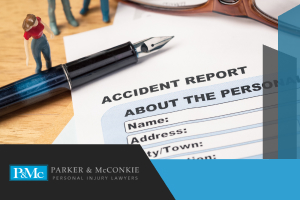
After an accident, your focus is to preserve as much evidence as you can. There are some cases when a victim unknowingly tampers solid proof. To avoid this, we created a list to help you identify the best course of action after a truck collision incident.
• Do not leave or move your vehicle unless necessary. You must not drive your vehicle after the accident. It would be best to wait for authorities to document your accident before moving your car. The officers may instruct you to move your vehicle if you are causing significant traffic congestion.
• Seek emergency medical attention. If you feel any form of discomfort or pain after the accident, seek emergency medical attention. You may also receive injuries from your seat belt during the accident. Wounds from a truck accident can be fatal if they’re not treated immediately.
• Call the authorities. Your safety and the safety of other individuals should be your top priority after a truck accident. You must call authorities to highlight the situation, document your injuries, and provide instructions.
• Gather the necessary information from the accident scene. You need to gather the essential information from the accident scene. Information at this early stage of filing a claim is crucial as it will help us construct your case better. Obtaining the other driver’s contact information, employer information, and insurance information is vital.
• Keep as much evidence as you can. You must keep any evidence from the accident scene, including your personal belongings. Photograph all damages to your vehicle. Keep the receipt of any medical expenses for future reference.
• Avoid disclosing too much information. As a victim, you must avoid revealing too much information when speaking with insurance adjusters. You should not trust any information from the authorities or the other party in an accident. If they want to record your statement, make sure you contact our Utah truck accident lawyers for assistance.
• Contact a Utah trucking accident attorney. The sooner you contact an experienced Utah truck accident attorney, the better. It would be best to get a legal expert handling your case and maximizing your claim. Our legal team will work for you and ensure that you receive the maximum compensation available.
Most manufacturers equip commercial vehicles with essential equipment that assists specialists and investigators in reconstructing the accident. This feature can be a handy tool in establishing liability for the accident.
The “black box” of the vehicle holds electronic data on the truck’s acceleration and deceleration history. Moreover, this device can also track the vehicle’s GPS position, airbag deployment, speeds, and other information. These details can vanish rapidly. Therefore you must ask for assistance from our Utah semi-truck accident lawyer as soon as possible to preserve evidence to build a compelling case.
Suppose a truck driver harms you in a collision or a near-collision accident. In that case, you need to contact one of our experienced Utah truck accident lawyers immediately. Trucking accidents are document-intensive matters that require an understanding of the appropriate Federal laws and regulations.
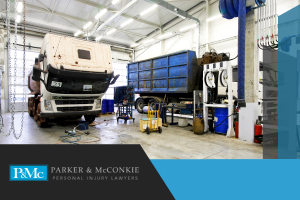
Semi-trucks and commercial trucks are heavier than other cars on the road. Semi-truck drivers have a greater obligation to drive safely on the road. This is because they can inflict more damage than most automobiles on the road if they do not obey traffic regulations.
Before embarking on a journey, they must check that all tires, brakes, lights, horns, and other truck parts are in good working condition. The law requires truck operators to maintain their vehicles constantly.
They must also restrict the amount of time they spend on the road to minimize driving exhaustion. Truck operators must document their time in logbooks. They must also keep the vehicle and trailer suitably clean to see the reflective tape at night. These are just a few precautions drivers must take to keep everyone safe.
The law obligates trucking companies to recruit responsible drivers with a clean driving record. It would be unethical for a trucking company to hire a truck driver with numerous past DUI records. Hiring irresponsible drivers is detrimental to their business. As a result, trucking enterprises must do thorough background checks before appointing a commercial truck driver. Drivers must also pass road tests, satisfy physical requirements, submit to drug and alcohol testing, and follow other state restrictions. Choosing the best person for the role will ensure a safe and efficient trip.
It’s also worth noting that employers are liable for their employees’ mistakes. This shared liability is known as “vicarious responsibility” or respondeat superior in the legal realm. In other words, if a truck driver caused an accident while on duty and injured another person, their company or employer is responsible for providing compensation.
Victims can hold trucking companies accountable for their driver’s carelessness, whether from negligent supervision, employment, or entrustment. Most businesses also have internal standards and guidelines that drivers must observe. We investigate any rule infractions to keep everyone safe and get the outcome you deserve.
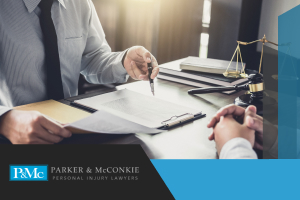
Parker & McConkie has been helping personal injury victims since 1978. Throughout our 40+ years of serving Utah residents, we have assisted our clients in recovering millions of dollars in compensation. In fact, in a recent trucking accident case, we were able to help our clients obtain a $9 million settlement.
Furthermore, our Utah truck wreck lawyers have received several accolades for their outstanding service. Quite recently, our attorney James McConkie has been named ‘Lawyer of the Year’ by the Utah State Bar. Furthermore, The National Trial Lawyers Top 100 also recognizes our team of personal injury lawyers.
Our Utah truck accident law firm is available 24 hours a day, seven days a week. If you require competent legal assistance, please do not hesitate to contact our firm right away. Our potential clients will receive a free consultation, and we work on a contingency fee basis.
The trucking company is liable for its driver’s negligence when a driver injures someone due to careless driving. For instance, if a commercial vehicle operator was speeding when they hit your car, causing severe injuries and substantial property damage, the trucking company will be held financially liable for the damages.
Suppose a truck driver injured you in Salt Lake City or elsewhere in Utah. In that case, we encourage you to contact our law office urgently. We will fight on your behalf for your rights and help you recover the compensation you deserve.
Yes and no. Utah has adopted the modified comparative negligence doctrine. Under UCA § 78B-5-818(2), victims who are at least 50% at fault for the accident cannot claim any amount from the truck accident. The law clearly states that an accident victim can only recover compensation if they establish that they are less than 50% at fault for the accident.
It would be better if the victim establishes that they do not share any responsibilities for the accident. Because of this possible forfeiture of compensation, you must hire an experienced truck accident lawyer in Utah.
Many accident victims prefer to forego a trial and settle their claims out of court. Doing so cuts the time and expense of going through litigation. However, this is not always the case.
There are instances when a plaintiff and defendant cannot agree on a settlement. In such circumstances, undergoing a trial is necessary. Parker & McConkie lawyers have vast experience representing clients before the court.
Accepting an insurance company’s first settlement offer is not ideal. Most Utah truck accident lawyers deem it a grave mistake. Victims cannot recover maximum compensation in an initial offer most of the time.
However, there are exceptions to this rule. First, the plaintiff must consider their injuries and other expenses before accepting the first offer. Suppose this arrangement does not account for all damages sustained due to negligence. In that case, you should disregard such a proposal and continue with the lawsuit process. Regardless, hiring a personal injury lawyer will help you prevent these mistakes.
Estimating the value of your truck accident case is complicated. There are many components that these cases involve. The nature and complexities of injuries you sustain play a significant role in determining the compensation amount.
You should know that pain and suffering have no definite financial value on their own. Some state legislatures set thresholds where non-economic damages will not exceed a specific amount. It’s crucial to discuss these details with your Utah semi-truck accident lawyer to set appropriate expectations.
Moving your car after a collision is not advisable. Moreover, specific laws state that driving your vehicle after a crash is not allowed. Unless instructed by a police officer, you need to move your car to prevent significant traffic congestion.
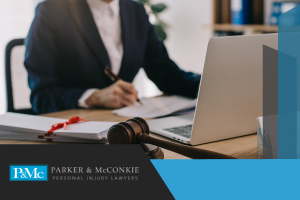
Parker & McConkie is an established personal injury law firm in Utah. Our successful track record speaks volume of our dedication to helping injured victims recover just compensation and attain justice.
Many people have suffered as a result of careless truck drivers. If you find yourself in this unpleasant scenario, please do not hesitate to contact us. You may reach a Utah Truck Accident Lawyer at Parker & McConkie by phone at (801) 845-0440. You can also fill out our online contact form on our website’s contact page.
Call 801-845-0440 to get in touch with a member of our firm after your accident. We can review your case for free!



